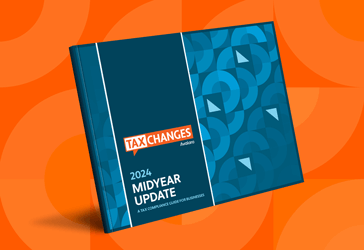
January 2022 Roundup: Tax laws you need to know
While you focus on your business, we stay on top of legislative and policy changes that can affect your tax compliance.
As online sellers in the real world face a rash of train heists and online marketplaces struggle to prevent sales of stolen goods, a growing number of businesses are setting up shop in the metaverse. This month’s roundup delves into these issues and more.
Nuts and bolts
A break from sales tax.
Energy Star products are exempt from Maryland sales tax on February 20. Specified emergency preparedness supplies are exempt from Texas sales tax on April 24. And on August 7, clothing priced $125 or less and school supplies priced $50 or less are exempt from sales tax in West Virginia. Why? Sales tax holidays. Learn more.
Change happens.
New exemptions are just some of the changes affecting sales tax rates in February 2022. Learn more.
Changing with the times.
Though services now make up the bulk of the United States economy, many services in many states still aren’t subject to sales tax. Indiana and Nebraska are two states looking to change that, and there could well be others. Learn more.
Different strokes.
Limited liability companies (LLCs) and sole proprietorships both have their advantages, but they’re governed by different regulations and must comply with different requirements and tax obligations. Learn more.
Keeping it real.
Some people spend time in virtual realities because they prefer it to their “real” lives. Some people go there to have a little fun. And some people are there to make money. For there’s money to be made in the metaverse — and where there’s money, sooner or later there will be taxes. Learn more.
Permit, please.
Before you can collect and remit sales tax in a state, you need to get a sales tax permit. Obtaining this all-important slip of paper can be more challenging and expensive in some states than others. Learn more.
We’ll take it.
One of the many reasons Tennessee isn’t a full member of the Streamlined Sales and Use Tax Agreement is because it hasn’t accepted exemption or resale certificates from other states. That changed on January 10, 2022. Learn more.
Beyond the border
Going global.
New markets and opportunities await entrepreneurial businesses willing to jump into the global market, but international sellers also need to navigate a raft of complicated cross-border compliance issues. Learn more.
Out with the watch springs, in with the drones.
Close to 200 countries use the World Customs Organization Harmonized Tariff Schedule (HS) to categorize and tax cross-border shipments, and HS codes changed on January 1, 2022. Learn more.
Taxing online sales
No excuses.
Minnesota has published updated guidance for marketplace facilitators and sellers. Collection requirements for marketplace providers originally took effect October 1, 2018, and were amended October 1, 2019, when the state revised its economic nexus threshold. Learn more.
Stolen goods.
Thievery is a growing problem for online sellers and marketplaces. In what feels a bit like a blast from the past, cargo trains are being hit, the contents stolen or left for buzzards. And on the other end of transactions, marketplace facilitators are being asked to ensure their third-party sellers aren’t selling stolen goods. Learn more.
From the pump
Solutions beget problems.
Electric vehicles may not solve all our problems, but they’ll likely displace more and more of their gas-guzzling friends. This will affect tax revenue — and therefore tax policy. Learn more.
From the road
Cancel culture.
The hospitality industry may have recovered from the worst of COVID-19, but more obstacles lie ahead. On top of fluctuating bookings and staffing challenges, many hospitality businesses are facing higher operating costs, new regulations and tax requirements, even existential threats. Learn more.
Words matter.
States are going to great lengths to clarify which occupancy taxes remote sellers and marketplace facilitators are responsible for collecting. In Kansas, marketplace facilitators are not responsible for taxes due on accommodations provided by a hotel, but are responsible for taxes due on rooms that are not hotel rooms. Go figure. Learn more.
From the tap
Anticipation.
Key focal points for beverage alcohol in 2022 will likely include ongoing scrutiny of marketplaces and delivery apps, more calls for cocktails to go, and a push from the spirits industry to earn the same DTC rights wineries have. Learn more.
Sharing the love.
Though wineries can ship directly to consumers (DTC) in most states, that’s a privilege still out of reach for most breweries, distilleries, and retailers. California Senate Bill 620 could open an enormous DTC market to breweries and distilleries. Learn more.
From the wire
Old laws, new tricks.
More and more businesses are communicating with clients via messaging apps that use web-based integrations, or APIs, rather than standard cell-phone-to-cell-phone SMS transmission. While this can streamline communications, it’s often unclear which decades-old tax statutes govern these new technologies. Learn more.
Check out the Avalara resource center for more helpful information.
Stay up to date
Sign up for our free newsletter and stay up to date with the latest tax news.














